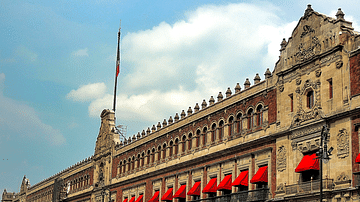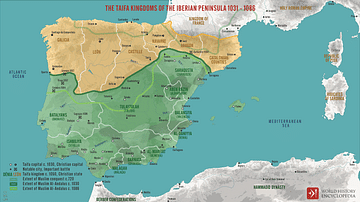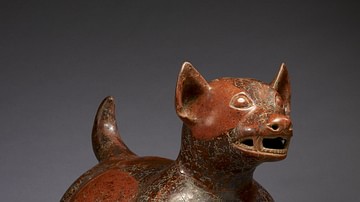Search
Remove Ads
Advertisement
Summary
Loading AI-generated summary based on World History Encyclopedia articles ...
Search Results

Definition
Leo Africanus
Leo Africanus (al-Hasan ibn Muhammad ibn Ahmad al-Wazzan al-Fasi al-Granati, 1485-1554) was a diplomat, merchant traveller and scholar who famously voyaged from Timbuktu to the Niger River and wrote 'The Description of Africa' (La Descrittione...

Definition
Isabella I of Castile
Isabella I of Castile (1451-1504), was Queen of Castile (r. 1474-1504) and of Aragon (r. 1479-1504) alongside her husband Ferdinand II of Aragon (1452-1516). Her reign included the unification of Spain, the reconquest of Granada, sponsoring...

Video
Documentary the rehabilitation of the traditional irrigation system of Barjas (Cáñar, Granada)
After twenty years of abandonment, and even forty in the case of the branch of La Hijuela, the traditional irrigation system of Barjas was rehabilitated in collaboration with the National and Natural Park of Sierra Nevada, and CEAMA. This...

Definition
The Description of Africa
The Description of Africa is the first comprehensive book about Africa, written by Leo Africanus, an African scholar trained in the Islamic intellectual tradition, in 1526, during the Italian Renaissance. A skillful mixture of anthropology...

Article
Colonial Government in the Spanish Empire
The apparatus of colonial government in the Spanish Empire consisted of multiple levels, starting with the monarchy and Council of the Indies at the top and moving down to the viceroy, audiencias, mayors, and local councils. The system was...

Definition
Reconquista
The Reconquista (Reconquest) or Iberian Crusades were military campaigns largely conducted between the 11th and 13th century CE to liberate southern Portuguese and Spanish territories, then known as al-Andalus, from the Muslim Moors who had...

Definition
Taifa
Taifas ("factions" or "camps") were small independent Muslim kingdoms and principalities that emerged after the fall of hegemonic Muslim caliphates in al-Andalus – the Muslim-controlled part of the Iberian peninsula – during the High Middle...

Article
Dogs and Their Collars in Ancient Mesoamerica
Dogs were an integral aspect of the lives of the people of Mesoamerica regardless of their location or culture and, throughout the region, were recognized as liminal beings belonging not only to the natural world and that of humans but to...

Image
Spanish Conquest & Exploration in South America in the 16th Century
A map illustrating Spain’s drive to expand its empire in South America following the occupation of the larger Caribbean islands by 1512. The promise of gold drove the Spaniards far and wide across the continent, from the Isthmus of Panama...

Image
The Taifa Kingdoms of the Iberian Peninsula, 1031-1086
A map illustrating the fragmented political situation in Al-Andalus (the Muslim-ruled area of the Iberian Peninsula) after the collapse of the Umayyad Caliphate of Cordoba in 1031. Known as taifas (from Arabic "party" or "faction"), numerous...